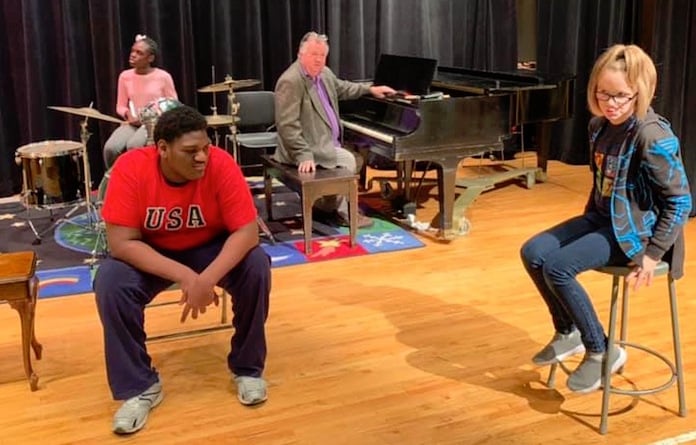Music connects teacher to the blind

At the first concert for his current job, Bryan Mueller got emotional as his youngest group of students performed.
“I was almost in tears at the first concert when they were playing their song because I was so happy for them to be on stage,” the music teacher with 35 years experience said. “None of these kids, if they were in a regular school, would have been in the school play or school musical as a leading role. So, that’s really neat.”
Mueller’s students would not have been in a prominent part at most schools because he teaches music at the Missouri School for the Blind.
In his over three decades of teaching music and choral classes, Mueller has worked at various private schools in the area, including at Ss. Peter & Paul Catholic School in his hometown of Waterloo.
He first learned about the Missouri School for the Blind, which is in St. Louis, when a jazz band he led at a previous high school job played there.
When the music teacher position opened, Mueller’s interest piqued because his uncle, also a music educator, has served as president of the North American Braille Association.
Once he got the job, Mueller took eight online special education courses from the University of Missouri-St. Louis to supplement his instrumental music degree, including two semesters of braille classes.
“The classes were challenging, but it just made sense to take them,” said Mueller, who had not taught special education students before.
That was five years ago, and Mueller has not looked back.
“I love it there,” he said of his job. “The administration is very supportive, and I like the kids.”
At the school for the blind, Mueller has students ranging from third grade to 21 years old. They are divided into classes for elementary students, middle school through high school pupils and transitional learners.
Likewise, Mueller’s students have various levels of needs. Some have multiple disabilities, including intellectual ones. Some are legally blind and some have visual impairments that require them to use large print or magnifying devices to read music.
Less than half or so of his students are completely blind, and Mueller said all his pupils can learn to play music.
“Having a visual impairment does not keep them from learning the musical notations,” he emphasized. “I tell a lot of other band directors, I treat the class just like I did for 35 years. The only difference is I have large print music and braille music, and sometimes I have to work with kids who have intellectual disabilities.”
Mueller teaches many of the same skills learned in traditional music classes.
He has a full band with singers and a rhythm section. His students perform in musicals and put on concerts. The school offers private lessons.
Much of that has been paused this year as the school has shifted to online learning. He also noted remote learning has allowed him to focus on another aspect of music education.
“I’ve taught more music theory and history content than I ever have because I can’t be building toward a live concert,” he said.
Still, Mueller said he misses performances like the one that filled his eyes with tears, so he is investigating ways of holding an online concert or performance of some sort via Zoom.
“We might try to do something and piece together a little skit, or students can record some of their parts on their own and we can put it together for a Christmas program,” Mueller said.






